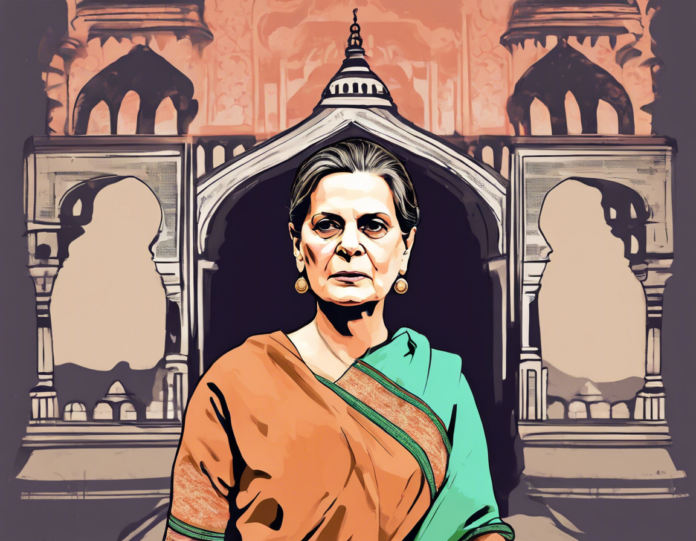Introduction
The recent visit of Sonia Gandhi, the Congress party leader, to Srinagar has raised significant interest and sparked debates across the political spectrum. The visit comes at a crucial juncture in Kashmir’s history, marked by political turmoil and unrest. In this article, we will delve into the various aspects of Sonia Gandhi’s visit to Srinagar, analyzing its implications, significance, and potential outcomes.
Sonia Gandhi’s Political Standing
Sonia Gandhi, the former President of the Indian National Congress, continues to be a prominent figure in Indian politics. Her visit to Srinagar holds considerable significance, as it signals the Congress party’s stance on the ongoing issues in the region. As a seasoned politician with a deep understanding of India’s political landscape, Sonia Gandhi’s visit to Srinagar is seen as a strategic move that could potentially influence the political narrative in Kashmir.
Purpose of the Visit
Sonia Gandhi’s visit to Srinagar was multifaceted, aimed at addressing several key agendas. One of the primary objectives of her visit was to interact with local party members and assess the ground realities in Kashmir. By engaging with party workers and residents, Sonia Gandhi sought to understand the challenges faced by the people of Kashmir and demonstrate Congress’s commitment to addressing their concerns.
Additionally, Sonia Gandhi’s visit was seen as a means to reiterate Congress’s support for the restoration of normalcy in Kashmir and the protection of the region’s unique identity. By vocalizing the party’s stance on issues such as autonomy and statehood, Sonia Gandhi aimed to resonate with the sentiments of the Kashmiri populace and position Congress as a viable political alternative in the region.
Public Perception and Response
Sonia Gandhi’s visit to Srinagar elicited mixed reactions from the public and political observers. While supporters lauded her efforts to connect with the people of Kashmir and uphold their rights, critics viewed the visit through a lens of political opportunism. Some questioned the timing of Sonia Gandhi’s visit, citing it as a strategic maneuver to garner electoral support rather than a genuine display of concern for Kashmir’s welfare.
Nevertheless, Sonia Gandhi’s presence in Srinagar served as a rallying point for Congress supporters and offered a platform for the party to articulate its vision for Kashmir. The visit helped reignite discussions on key issues such as Article 370, statehood, and the region’s political future, underscoring the complex dynamics at play in Kashmir’s socio-political landscape.
Implications for Kashmir’s Political Future
Sonia Gandhi’s visit to Srinagar has far-reaching implications for Kashmir’s political future and the broader discourse on regional autonomy. By engaging directly with the people of Kashmir and reiterating Congress’s commitment to their rights, Sonia Gandhi has positioned the party as a key player in shaping the region’s trajectory.
Additionally, Sonia Gandhi’s visit underscores the importance of sustained dialogue and engagement in resolving the longstanding issues facing Kashmir. By prioritizing people-centric approaches and advocating for inclusive governance, Congress aims to foster a climate of trust and cooperation that is essential for lasting peace and stability in the region.
Conclusion
Sonia Gandhi’s visit to Srinagar serves as a pivotal moment in Kashmir’s political landscape, spotlighting the intricate interplay of power dynamics, public sentiment, and policy imperatives. As the region grapples with ongoing challenges and aspirations for self-determination, Sonia Gandhi’s presence signifies a nuanced approach to addressing the multifaceted issues confronting Kashmir.
Through dialogue, empathy, and strategic engagement, Sonia Gandhi and the Congress party have the potential to shape a more inclusive and sustainable future for Kashmir. By listening to the voices of the people, advocating for their rights, and fostering meaningful partnerships, Sonia Gandhi’s visit to Srinagar embodies a step towards reconciliation, understanding, and progress in one of India’s most complex and contentious regions.
FAQs
-
Why did Sonia Gandhi visit Srinagar?
Sonia Gandhi visited Srinagar to interact with local party members, assess ground realities, and articulate Congress’s stance on key issues in Kashmir. -
What was the public response to Sonia Gandhi’s visit?
The public response to Sonia Gandhi’s visit was mixed, with supporters praising her engagement and critics questioning the timing and motives behind the visit. -
What are the implications of Sonia Gandhi’s visit for Kashmir’s political future?
Sonia Gandhi’s visit has implications for Kashmir’s political future, shaping discussions on autonomy, statehood, and the region’s broader trajectory. -
How does Sonia Gandhi’s visit contribute to the dialogue on Kashmir’s issues?
Sonia Gandhi’s visit contributes to the dialogue on Kashmir’s issues by prioritizing people-centric approaches, inclusive governance, and sustained engagement. -
What are the key agendas of Sonia Gandhi’s visit to Srinagar?
The key agendas of Sonia Gandhi’s visit to Srinagar included interacting with local party members, understanding ground realities, and reaffirming Congress’s commitment to Kashmir’s welfare.
